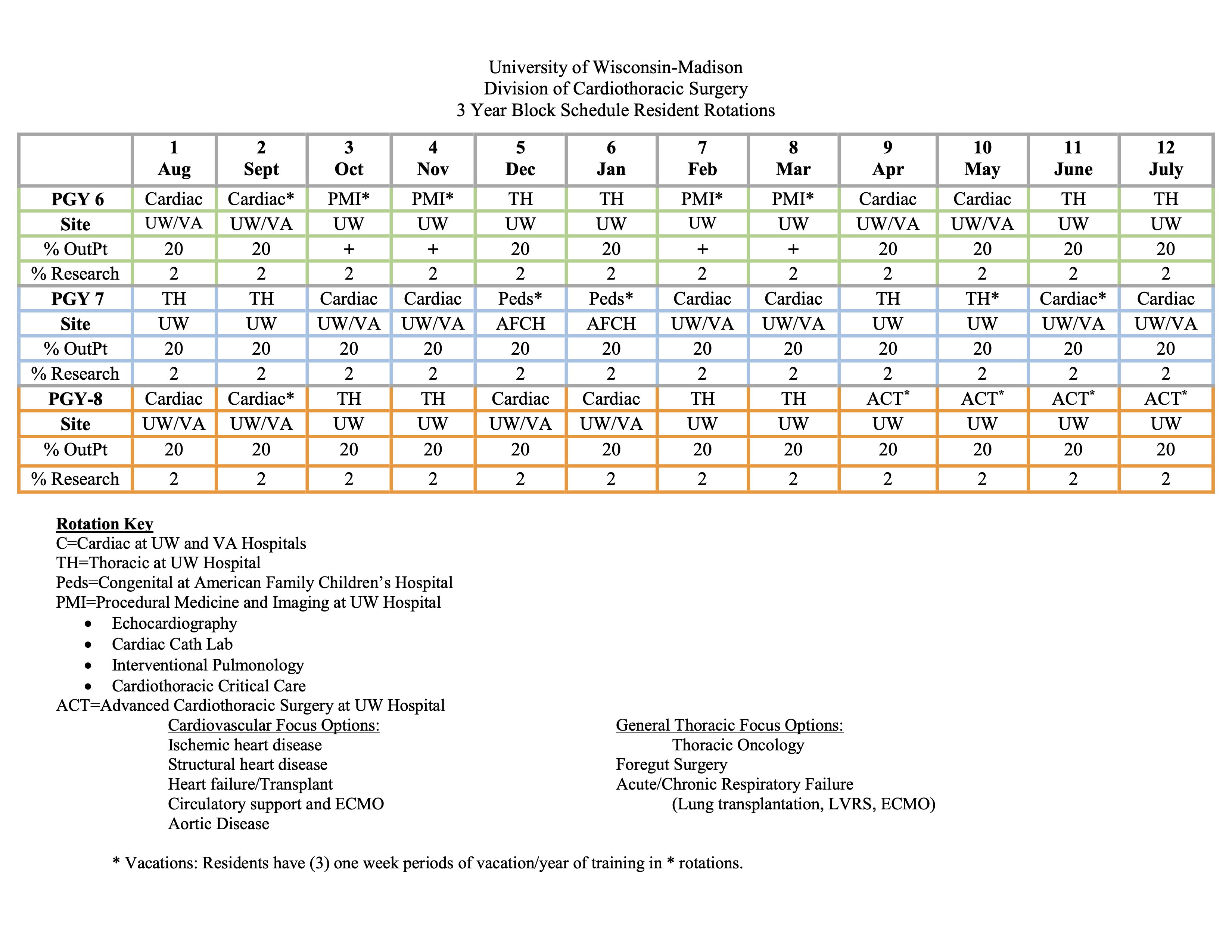The training program is organized to provide three continuous years of thoracic surgery. As a cardiothoracic resident, you will see patients from throughout Wisconsin and neighboring states. You will serve at the University of Wisconsin Hospital (UW), and the William S. Middleton Veterans Administration Hospital (VA), an affiliated institution. Both of these facilities deal with a full range of cardiac, pulmonary, esophageal, diaphragmatic, and mediastinal problems. You will also complete a two-month rotation in pediatric cardiac surgery at the American Family Children’s Hospital.
Every patient who is admitted is assigned to a member of the attending staff, who is responsible for overseeing and guiding you. You will be assigned cases according to your experience and ability. As these increase, you will have progressively more responsibility and will perform more complex procedures. You will participate actively in and have major responsibility for diagnosis, planning, and treatment for all patients. After consultation with the attending staff, you will perform a large number of the operations. A member of the attending staff is scrubbed during all operations. If, in the opinion of the attending, an operation is beyond your experience and ability, the attending performs the operation and you have the option of being first assistant.

FIRST YEAR
In your first year, you will be responsible for the consultations and pre- and postoperative care of patients on your respective services. You will frequently perform pulmonary resections, esophageal surgeries, single valve replacements, and uncomplicated coronary artery bypass surgeries.
SECOND YEAR
In your second year, you will increase the complexity of your operative case experience in all areas of surgery. As the senior cardiothoracic resident on a given service, you have the option of participating fully in the care of patients or assigning their care to general surgery residents. At all times, the general surgery house officer reports to you—and you are ultimately responsible for confirming and documenting all consultations and have the option of performing any of the procedures. All members of the house staff report to you for direction in the management of patient care problems. With the attending staff, you may assign specific cases to the general surgery PGY-1 or -2 resident, who then becomes responsible for these cases and reports directly to his or her attending. You will be responsible at all times for the administration and supervision of the clinical services and of house staff assigned to all three services.
THIRD YEAR
Your third year is the culmination of your training experience. By this point, you will have determined if you will pursue cardiac surgery, congenital cardiac surgery, thoracic surgery or a combination of cardiac/thoracic for adults. The third year will allow you to have dedicated experiences within your chosen area of interest. For example, if you chose to pursue cardiac transplant, you will spend dedicated time with our heart failure and transplant program to tailor your experience for advanced learning. Each trainee will have a third year which looks different, and unique to the resident.
At the VA Hospital, you will work closely with a physician’s assistant who manages the cardiothoracic clinic. You will be responsible for all patients under your care unless you are on vacation or administrative leave.
You will receive academic guidance through several mechanisms. At all times there will be close contact between you and the attending staff. Each attending makes rounds with you on patients in the intensive care unit, intermediate care unit, and wards. Prior to operations, you and the attending will review the case, discuss the technical approaches, and consider possible problems. Each of the collaborating services (cardiology, oncology, pediatric cardiology, pulmonary medicine, and radiation therapy) has excellent training programs and also participates in your education and training.